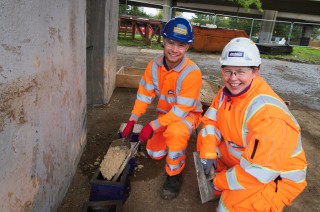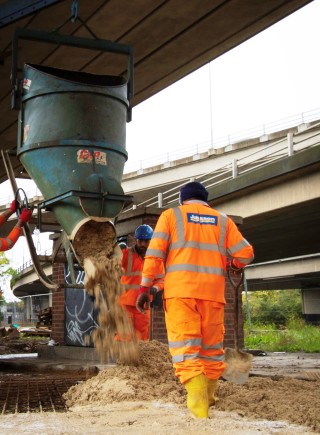Cemfree, the low carbon concrete produced by DB Group, is being trialled more and more widely but a team working on an M25 viaduct has been the first to use it in conjunction with volumetric trucks that mix the ingredients on site in just the quantities required.
Working on behalf of Connect Plus, a team from Jackson, DB Group and concrete firm Axtell used Cemfree to pour concrete hardstanding on the £3.5m Woodford West Viaduct repair project.
DB’s main sales pitch for Cemfree is that it has less embedded carbon than conventional ordinary Portland cement. The Woodford West Viaduct application amounted to 52 m3 of concrete, leading to a saving of 9.4 tonnes of CO2 when compared to using a conventional OPC mix. The CO2 value of Cemfree is listed as 114 kg per tonne, 77% lower than conventional mixes.
Main civils contractor Jackson has been working with the low carbon concrete for the past few years but it has always been challenging to use on the M25 because batching plants are usually shut at night when motorway works are generally carried out.
Instead, this trial has proven the suitability of volumetric mix trucks, which are able to produce just the right amount, at the right time, day or night, without having to rely on a batching plant to dedicate an entire silo to the product.
Paul Watson, the director of Jackson’s highways division, said: “We’re really pleased to have introduced ultra-low carbon concrete to the M25, and credit must go to our client Connect Plus who, as an intelligent client, supports us to trial new materials.”


He added: “Our work with Axtell has proven that we’re able to supply the low-carbon material at no extra cost, and without having to place a large order with a ready-mix supplier, which makes the material far more accessible to use on the M25. We hope this marks a turning point on the M25, and the wider highways sector for using low carbon alternatives.”
Connect Plus chief executive Andy Dean said: “Connect Plus is committed to reducing carbon emissions across the M25 network and we're thrilled to be supporting this progressive innovation.”

Previous Cemfree projects have included piled foundations by Keltbray on Taylor Wimpey’s housing development in Mount Pleasant, London and for kerb backing, drainage, mass fill and signage on the A14 upgrade in Cambridgeshire.
DB Group commercial manager Tony Sheridan said: “As well as enabling significant carbon savings versus a more traditional concrete mix, Cemfree offers enhanced durability and considerable savings in water consumption. Cemfree also allows contractors to consider larger pours with fewer joints as the relatively low heat generated during the curing process leads to less cracking in the finished concrete. Interest in Cemfree has grown considerably over the past few years as environmental issues and climate change have come more into public focus.”
Got a story? Email news@theconstructionindex.co.uk



